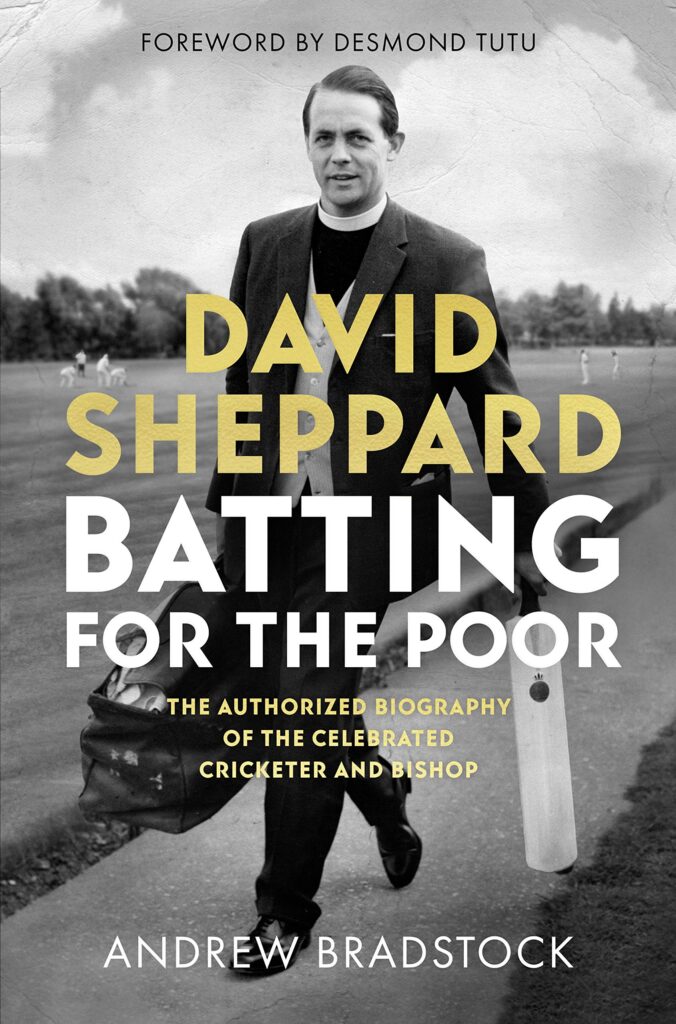
I first met David Sheppard sometime in the early 80s just after my ordination. He was present with his wife Grace at an opening of an exhibition in Liverpool city centre. It was held at the Diocesan Church House – now a popular Tapas bar ! The artist had completed some of the pieces while we were at theological College in Cambridge. The pictures might have best been described as bold, colourful and adventurous !
What do I remember? First that Shepperd turned up ! Second he seemed genuinely interested in the Art and the people – he was relational, attentive and present ! Third, physically with his tall and striking demeanour he dominated the space. Naively I thought this was what all Bishops should be like.
This is a carefully written book that reveals much about history, politics, (not surprisingly!) religion, leadership, ambition and privilege. David Sheppard is examined and explored, admired and described with diligence and affection.
I wonder what a younger generation would remember of him now? There will be many in Liverpool who celebrate his life and legacy. His sporting prowess as a batsman ? His theological maturation and growth? His partnership with Archbishop Derek Worlock? Perhaps especially his inner-city leadership combined with radical social concern ? These are all examined with skill and care that bring the person alive. It is hard not to admire his sacrificial service and integrity combined with an independence of thought and action.
So what makes for a good leader?
So – tell me – what makes someone a natural leader? Can you learn it? Is it genetic – inherited from School, parents and teachers? Sheppard was shaped by a conventional upper middle class background with a church going family, preparatory and public school, military service and Cambridge. We are told he had character that was combined with self control and effort. Bradstock goes beyond these influences to paint a more complex and interesting picture of a man who at key stages in his life embraced change and exercised an independence of mind. Depth, passion, hard work, conversion and prayer all shaped his life. It is hard not to admire the integrity and honesty in this picture. Bradstock maps out how Sheppards faith developed and the experiences that formed his convictions.
Cricket shaped him. He graduated from Cambridge cricket to county cricket and then to test-match cricket. He was named one of Wisden’s five Cricketers of the Year in 1953: “few cricketers had achieved as much as Sheppard by the age of 23. Tall and well-built he looks a batsman from the moment he takes guard.”
All of this potential as a first class sportsman, was laid aside as he responded to the call to ordination. Parish work in Islington and Canning Town led to a bishopric in Woolwich and from there to Liverpool. At one level this ‘preferment’ was effortless but in other respects costly. He was deeply driven, passionate, single minded and ambitious. These human characteristics all played their part in our lives.
Bradstock maps out a series of changes in Sheppard as faith matured. He described his time at the Mayflower Family Centre in Canning Town as a “second conversion” to “Christ in the City”: “Gradually I realised that loving individuals would not shift some of their greatest needs unless the structures of society were attended to also.”
The biography describes some of the challenges of Liverpool that Sheppard embraced – both social and ecumenical. Unemployment, a lack of investment and divisions between Irish Catholics and English Protestants shaped his ministry . Sheppard was able to see the difficulties and then act with courage. Church and city belonged together as faith was put into practice. Faith in the City and the Church Urban Fund were part of this social action. Not surprisingly Sheppard, on retirement, was made a life peer.
The light and shade of all life?
The writers pen is kind here and righty so. To return to my original starting metaphor – most art manages to combine a subtle mixture of light and shade. All human beings reflect that.
Entitlement, privilege and a patrician manner feed into a certain style of leadership – still evident amongst some Bishops today. It is, this reviewer admits, difficult to act out the projections and expectations that come our way. Maintaining our singular individuality and independence is a fundamental challenge for all leaders. However we all need to be honest with ourselves and others about how our leadership might impact on others. Confidence is one thing but it is a close partner to arrogance. And ambition when it is so singular has significant effects those we love. Bradstock describes the challenges Sheppard’s family faced and discusses the impact of his decisions on his wife’s mental health problems.
This is a good book of a life worth honouring and remembering. We all want to make a difference and Sheppard certainly achieved fragments of legacy that live on in Liverpool and beyond.
